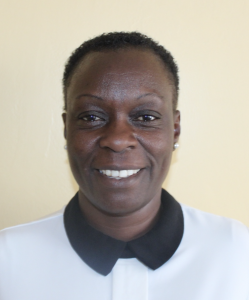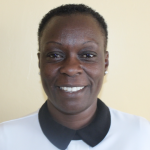Mukambi Baptist Primary School is located in a bustling part of town. It is surrounded by a busy motor road, civic offices, several shopping centers, a police station, and a health clinic, in addition to the Shianda Baptist Church, for which the school is named. The school campus has retained many trees that help add shade and privacy to the learners in an otherwise highly active area.
With 1,294 students and 28 teachers and staff, Mukambi is a large primary school with a significant water need currently not met. The high student population also demands attention to sanitation and hygiene through latrines and handwashing stations. That is why in 2019, when we first started working with Mukambi Baptist Primary School, the school and we agreed to a project that would bring water, latrines, and handwashing stations to their school.
At the time, the latrines were in a particularly dire state that risked the school's closure by the Ministry of Health due to its lack of adequate sanitation facilities. That is when we decided in late 2019 to build two three-door blocks of ventilated improved pit (VIP) latrines, accompanied by two new handwashing stations and hygiene and sanitation training, to keep the school from closing. The water point would follow.
Then, in 2020, the COVID-19 pandemic hit, and all plans of constructing a water point for Mukambi Baptist Primary School came to a halt. It is only now, with Kenya's recent reopening of all in-person learning for schools across the country in January 2021, that we have been able to resume plans with the school to help resolve their water crisis by installing a borehole well.
Currently, water at Mukambi Baptist Primary School comes from students carrying it from one of two off-campus sources: home or a spring in the village.
The water students bring from home comes from unknown sources, meaning its quality is questionable and sometimes makes students and staff sick. Because of their small containers, the amount of water students bring in the morning is never enough to meet all of the school's drinking, cooking, and cleaning needs. The water quickly runs out by late morning, when students are sent to the spring to fetch more.
Students have to cross the busy road full of cars and speeding motorbikes to get to the spring. Students must then wait for community members to fetch water first before any students are allowed a turn at the spring. The walk and wait at the spring cost the students time and energy that should be spent learning in class. The twice-daily road crossing also puts the students' safety at risk. Teachers and parents alike cringe at the thought of an accident.
"The situation of water has really affected me. Sometimes I feel bad when we are told to fetch water from the spring during class time instead of learning. It affects our performance," said pupil Nelly.
"As a school that has insufficient drinking water, the classrooms, latrines, and staffroom are not cleaned daily due to lack of water, which is risky to our health," said Deputy Headteacher George Odenyo.
Mukambi Baptist Primary School has endured a severe water crisis long enough. It is time to complete their project by bringing clean, safe, and reliable water to their campus.
What We Can Do:
New Well
We conducted a hydrogeological survey at this school, and the results indicated the water table beneath it is an ideal candidate for a borehole well. Due to a borehole well's unique ability to tap into a safe, year-round water column, it will be poised to serve all of the water needs for this school's large population, even through the dry months.
The school will help collect the needed construction materials such as sand, rocks, and water for mixing cement. They will also provide housing and meals for the work team, in addition to providing local laborers. We will complement their materials by providing an expert team of artisans and drilling professionals, tools, hardware, and hand-pumps. Once finished, the school's students and staff will use water from the well and staff for drinking, handwashing, cooking, cleaning, and much more.
Training on Health, Hygiene, COVID-19, and More
We will hold a one-day intensive training session with students, teachers, and parents. This training will cover a wide range of topics, including COVID-19 symptoms, transmission routes, and prevention; personal and environmental hygiene; and the operation and maintenance of the rain tank, latrines, and handwashing stations. There will be a special emphasis on handwashing.
Our team of facilitators will use various methods to train, including participatory hygiene and sanitation transformation and asset-based community development. We will initiate a student health club, which will prepare students to lead other pupils into healthy habits at school and home. We will also lead lectures, group discussions and provide illustrative handouts to teach health topics and promote good hygiene practices within the school, including handwashing and water treatment. We will then conduct a series of follow-up training before transitioning to our regularly scheduled support visits throughout the year.
The school and we strongly believe that all of these components will work together to improve standards at this school, which will help lead to better student academic performance and unlock the opportunity for these students to live better, healthier lives.

 Borehole Well and Hand Pump
Borehole Well and Hand Pump
 Rehabilitation Project
Rehabilitation Project







































